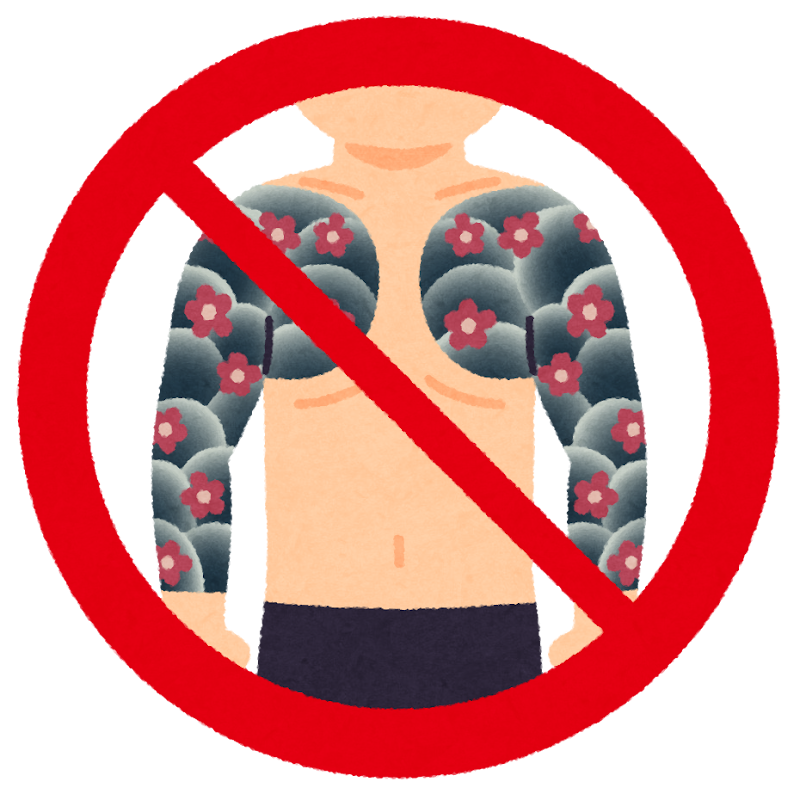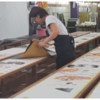- JUL 27, 2021 11:33
The Beauty of Japanese Tattoos and Why They Are Controversial - Interview with Masa
Masa is a tattoo artist at the Studio Muscat, located in Shibuya. We had the chance to interview him about tattoos in Japan, his artwork, and the stigma in society.
- LIKE46
- 7687views
With their mesmerizing designs, wide range of colors, and sheer amount of different styles, tattoos are the archetype of body art. Whether it is purely decorative, with a special meaning, or pictorial, there are no limits. In most countries tattoos have become a well established form of art long time ago. In Japan, however, a negative image as well as social stigmas towards people with tattoos are still widely common. It is not unusual for people with tattoos to be refused to enter onsens, public swimming pools, or hide them when working out at the gym.

Source:https://bit.ly/3noXcwS
This is due to the strongly ingrained belief that only gang members, or Yakuza, have their bodies marked with the beautiful ink.
The Difference Between「入れ墨 」- Irezumi,「タトーウ 」- Tattoo, and「刺青 」- Shisei
In Japanese, there are three difference words for tattoo: Irezumi, the katakana word of tattoo, and shisei. In the 18th century, Irezumi was used as a punishment for criminals. They would insert ink into the forehead of the offender in order to visualize their wrong deeds.
Shisei was first used by the author Junichiro Tanizaki as the title for his novel 「The Tattooer」in 1910. However, throughout the years the reading changed to irezumi again. Nowadays both words have the same meaning, and refer to tattoos with typical Japanese symbols such as the dragon. Nevertheless, irezumi is more commonly used in Japanese.
As Japan was more and more exposed to Western culture and media throughout the past century, they derived the word tattoo from English into Japanese. It usually refers to tattoos that incorporate western style and symbols.
So why is this link between tattoos and gang members still so prevalent? Will Japan be able to overcome its judgement and officially recognized this form of art? I had the chance to meet the tattoo artist Masaki Sakurai in his studio, ask him many questions, and hear his perspective of tattoos in Japanese society.
Masa

Tattooist Masa
Tattoo studio "Studio Muscat" located in Shibuya, Tokyo
Could you please briefly introduce yourself?
I was born and raised in Tokyo. I only graduated from high school and I was not engaged in any job related to art for approximately ten years. Although I did not go to university to study I was doing an office job at a university for several years.
How did you start to get involved in the art of tattooing?
I was working in the office for nearly ten years. Once I turned 30, I asked myself if I wanted to do another ten years doing the same kind of job. However, after thinking a long time I realized that I wanted to work with something related to art, since I am really good at drawing. 15 years ago there was not much information available on platforms such as Facebook, let alone Instagram. Therefore, the only option that I could imagine at that time that was close to art and really realistic was to become a web designer. Unfortunately, I am horrible when it comes to technology. So I knew that was not going to happen. And just being an artist that draws paintings is pretty unrealistic as there are few people that will succeed or can make a living. Luckily, when I turned 30 there was more information about the tattoo industry it started to become more popular. Despite being a tattoo artist was not my calling, but considering all the circumstances, it became a creative and realistic choice for me.
According to you, what makes Japanese tattoos different from western tattoos?
I think mainly history. Another important aspect is the elements used in the design as they are different. Japanese tattoos tend to incorporate elements that symbolize Japan's culture such as koi fish, fox, and crane. Western designs, for instance American tattoos on the other hand, feature American symbols such as eagle or bull.


What are the differences between traditional and modern Japanese tattoos
I always consider my tattoo style as modern. I don't think there is an exact set of patterns that defines modern Japanese tattoos, however, my style is for sure not traditional. Traditional Japanese style has specific rules and you have to follow them. You cannot just choose any animal or randomly place the elements. Those are things you can only learn from tattoo artists who know very well the symbols and history behind it. Dragons are a must and common designs feature koi fish, sometimes even crane, Sakura, or Japanese maple leaves. “Onie”, the Japanese demon is also widely used. A distinctive difference between modern and traditional Japanese tattoos is the specific placement of the elements. If you are going to put the dragon and koi fish together, the dragon has to always be higher since it is coming from the sky, representing air. The koi fish on the other hand, has to always be placed under it because it's coming from the oceans, representing water. Even if you have really good drawing or tattooing skills if you do not follow those rules it cannot be considered a traditional Japanese tattoo.
I have very deep respect for traditional Japanese style. I have interest in it but it is not something I can just do right away. I think it would be disrespectful. Since artists who specialize in traditional Japanese tattoo art learn from mentors over years. There has been a significant increase of artists who do traditional Japanese tattoo art in the past ten years thanks to the internet and social media. However, it seems that some artist doing it did not learn the proper way. You can tell by the color choices, placement of the elements, or the shape. For instance, I think that the wave usually goes with koi fish, but some artists combine it with other animals. It is possible to combine it with other animals, but the koi fish is considered the norm. There are so many rules you have to follow but many tattoo artists just do what they see on the internet.
Many of your tattoo designs feature symbols from nature. What exactly inspires you to create those designs?
When I draw something the inspiration comes from everywhere. Sometimes when I watch a movie and in one specific scene I see for example a palm tree in the background I just start to build on that image. Or when I walk on the street and see an animal, plants, or something that catches my attention and makes me stop. I see the image and start adding other elements to it through my imagination. It also happens that the whole picture just pops up in my head and everything is already neatly put together. Usually it’s related to nature, and I rarely get this kind of inspiration from human made objects.


My absolute favorites are your fox tattoos. Is there any special personal meaning behind it?

I love foxes but I also like other animals as well . The reason why I love foxes is because it is kind of neutral. Fox can be she or he. Of course I don’t want to be judgmental and say that lions are always male or that cats are female. I mean it's just a stereotype. But foxes can be either way, it can be cute or edgy, depending on the facial expression. And also in Japan, it is a spiritual animal. If you go to a temple you can encounter fox statues on both sides of the entrance as it has a mythical connotation. In my art I prefer to make things more mysterious, and the fox is the perfect animal for that. That is why I sometimes add the fox mask on top of the fox, which emphasizes the mysterious side of this creature.
I do not want the message to be clear and fully explained in order to leave freedom of interpretation of the artwork. I usually do not even have a message. Long time ago somebody asked me “What does this artwork mean”? So I tried to give some explanation, yet the person thought about it as something completely different. Once you put out a message people will automatically think only about that. So the art will lose the opportunity to be something else.

Do you think that a tattoo should always have a personal meaning?
Not necessarily. Of course it is good if you have a really deep meaning and something that symbolizes you or something about your life. However, sometimes you just see something and you think It is really cool, perhaps even might symbolize you in a way. Ten years later if you look at the tattoo you might not think the same way about it. It is totally okay, and it will remind you of when you were that age and that particular period of your life. The meaning will change over time. Sometimes art has a meaning and sometimes it is just for fun, or maybe it will have a meaning later. Having said that, sometimes it is more about quality and how the design fits your body. That is why some people would just like to have a sticker tattoo. But I personally think that the tattoo should fit your body shape.


Which one is your favorite tattoo design that you made and why?
That is difficult to answer. It is hard to say what is my favorite work. Once I am done I am already on to the next idea. But I generally enjoy fox tattoos.
When I draw something it is my favorite at that moment. After I finish it and start drawing the next one my feelings toward it change as I already saw it and got too used to it.
According to your introduction on the website, is says that many people have dark and beautiful fantasies, could you further explain that?
I believe that people have a positive and negative, bright and dark side. I like both sides. It makes us more human and everything more interesting. When interacting with people, having a more positive side is obviously a good thing. However, when it comes to art if everything is always positive, it is not very tempting and a little boring. Just like a super perfect person. That is great but it is also not so exciting, and rather like a robot. Therefore, I think humans are more interesting if they have both sides, I like imperfections. Some ideas are a little dark. For example, in Spain there is the traditional bull fight. At the end of the fight the bull gets killed by the sword penetrating through its head. However, if you change roles and it is the bull that is hunting the human, things turn even darker and more twisted. I find that visually it looks more interesting. But people will consider it a horrible picture because it is the human that is getting killed. I like to mix things and change the roles.


Tattoos are still often linked to Yakuza gang members. What do you think about this?
I completely understand why people have those ideas because we have a long tattoo history. However, the perception of tattoos has changed throughout history and depending on which period, it was also considered art, especially koi fish, waves, and the dragon. Only later were tattoos linked to gangs and criminals. At first it was only some specific symbols. I read that during the Edo Period, if you were a criminal and they put you in jail you would get a line as a tattoo. Depending on which city you committed the crime the line would be different. At some point in history Yakuza started to also have those traditional symbols mentioned before. And it became a way for gang members to show that they are a badass person. That is one of the reasons why many japanese people still think that tattoos mean yakuza. Especially if the person is fully covered with traditional Japanese symbols they will definitely think that this person is a gang member.

Do you think that society’s negative stigma towards tattoo is changing?
Slowly, but it is changing within the younger generation. But if you compare with other countries Japan is still way behind. Thanks to Instagram and other social media platforms you can see people from everywhere and if you follow Western celebrities many of them have tattoos, even athletes. It has become more popular and relatable. But the older generation is still very reluctant towards tattoos. I think Japan is a very conservative country and not good at changing their rules. In our society it is hard to accept new things, change outdated practises or mindset. Not only about tattoos but in general.

How important do you think is Japanese tattoo art for Japanese culture?
Well, personally because I work in this industry I think it is very important. Tattoo art is one of the most underrated Japanese cultures. Compared to other countries, Japan has one of the longest tattoo histories, and people from abroad respect and envy us for that. There are so many people who come to Japan to get Japanese tattoos inked on their body. But ironically, most of Japanese people think this is not even art, and see it as something negative. The general public does not value it as much as they should, considering the long history of tattoos in our country. I wish that people here would appreciate it more, or at least have some pride in it. Since it is something that we can be proud of and show to the world.

What are your tips for people who would like to get their first tattoo?
I think it would be good for the customer and the artist to be open and flexible. It happens that the original idea and reality might be different. Tattoos are a unique type of art as it is applied on human skin. If it were just a design on paper, you would not need to worry about how it will heal. If you draw something on paper it might burn or get wet, and therefore change. But human skin does not work like that. We have to think how it will heal and change after that. Sometimes the image that you want is not approachable as a tattoo, because the shape will not fit the body. You should be open about possible changes.
As I said before, tattoos are an art and you should enjoy it. Maybe you just like the idea of getting a tattoo, or do it with friends. It should not matter too much if ten years later you think it is silly. It is not as if you are choosing organs. Maybe because I am used to it and see it every day (laughs).
However, if you are very serious about it do research. Depending on the kind of tattoo that you want you should look for a great artist, someone that is familiar with that style. Since every artist has their own style. Connection, research, and an open mind are important.
Is there anything you would like people to know regarding your art or tattoos in general?
Tattoo is something to appreciate, feel, and inspire. So just enjoy it. It's the same as any kind of art, just like music or movies. It is about the taste, some people like Picasso, some might think it is a five year old’s drawing. If you like it, great. If you do not, do not look at it. Do not talk bad about it and just enjoy it.

Considering the long history of tattoos in Japan and the world wide appreciation for its distinctive style we can only hope that tattooing will gain the recognition it deserves. With the expectation to host the 2020 Tokyo Olympics prior to the ongoing pandemic, many businesses have changed their "no tattoos allowed" policies, as a huge influx of foreign visitors, many of them proudly covered in tattoos, was about to enter the country. So we might see some changes and wider acceptance throughout society in the future.
How about you? What is your opinion regarding tattoos?
I really want to thank Masa for his precious time and this amazing interview.
(By Stefan)
Studio Muscat

Studio Muscat
Masa Sakura
Studio Muscat
posted by
- Powered by KIMONO BIJIN
Tags
You May Also Like
-
Tokamachi has a unique history as a kimono and textile production town, being nationwide accla...
- Sabikimono
- 2817views
-
How I started my Kimono journey in Tokyo and created my first handsewn Kimono within 6 months.
- Sabikimono
- 2833views
-
Makeup Artist Paladini PePe About Special Effect Makeup, the Future of Beauty, and Sadako
Whether it be photo shootings or film sets, they are a true master of their craft, and behind ...
- WAi! WAi! JAPAN
- 5445views
-
JLPT Needs to Change, and Here Is Why
The Japanese Language Proficiency Test is the most widely used Japanese language ability tests...
- WAi! WAi! JAPAN
- 5964views
-
5 Underrated Shrines and Temples in Tokyo and Japan
Five of the most underrated holy places in Tokyo. A must visit for people who cannot get enoug...
- WAi! WAi! JAPAN
- 6413views















